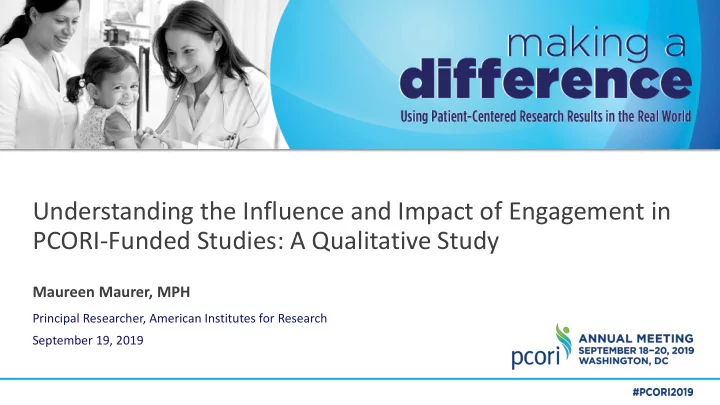

Understanding the Influence and Impact of Engagement in PCORI-Funded Studies: A Qualitative Study Maureen Maurer, MPH Principal Researcher, American Institutes for Research September 19, 2019
Maureen Maurer • Has nothing to disclose. 2
Our research questions were • How does engagement influence the planning and conduct of PCORI-funded studies? • What impacts to the study result from that influence? 3
Who did we talk to? • Selected 58 funded projects • 109 hour-long telephone interviews in English • 58 Researchers: Principal Investigators or another member of the research team • 51 Stakeholder Partners, 19 identified as patients or caregivers • Achieved diversity in • Study completion status • PCORI funding announcement types and priority areas • Experiences with engagement 4
Analyzed examples reported by researchers and partners • Catalogued examples from interviews • Identified types of • Influence – how partners contributed • Impact – or the results of those contributions 5
“From the very first glimmer, I was involved. We sketched out what a trial would look like together and wrote the grant together.” (Partner) “ The providers were really critical in helping us make decisions around how the [intervention] was going to be integrated into the [clinic] work flow.” (Researcher) 6
Researchers and partners shared nearly 400 examples 7
What did partners influence? • Study plans and conceptualization • Study materials and dissemination products • Carrying out study tasks • Engagement design and practice • Taught researchers about lives of patients, clinicians, organizations, and health care 8
How did partners influence the study? Multiple types of influence reported within a study 9
Impact: Results of partner contributions 10
“ The survey questions were coming in at a slower pace than what the researchers wanted...After we gave our suggestions, they realized a huge difference. They mentioned 80, 90 percent, up from 50 percent last year.’“ (Partner) “ They gave us insights and suggestions that we probably wouldn’t have come up with on our own that in the end improved the trial design, trial implementation, and hopefully, will give us the most meaningful results.” (Researcher) 11
Researcher- and partner-reported impacts No reported Engagement How well impact scope or the study • Did not know quality Study Study reflected • Could not remember feasibility user needs quality Acceptability • Too soon to and tell or Relevance preferences Multiple types of impact reported within a study 12
“ It’s challenging to put varied opinions together and come up with something that is scientifically sound, that addresses what the project is actually designed to do.” (Researcher) 13
What are the take-aways? • Engagement changes how studies are done - understanding of the extent and range of influence and impact • Think about how to apply the types of influence and impact • Planning and supporting engagement on a study • Measuring engagement differently • More to share and more to learn! 14
“ At first we viewed it as burdensome. But over time we started to see the value in the way it was impacting the decisions we were making and how we were carrying out the study so that it would be more relevant to patients and providers on the front lines.” (Researcher) “PCORI and this study has opened my eyes personally to how important my input is. I did not know that until I got involved with this study, how important my voice, how important a patient’s voice is in studies. (Partner) 15
Thank You! American Institutes PCORI Team for Research Team • Kristin L Carman • Rikki Mangrum Maureen Maurer • Rachel Mosbacher • Tandrea Hilliard Principal Researcher, • Andrea Heckert • Jessica Arnold American Institutes for • Andrew Amolegbe • Julie Kennedy Lesch Research September 19, 2019 • Kirsten Firminger • Laura Forsythe • Karen Frazier • Krista Woodward • Tamika Cowans • Beth Nguyen • Charis Yousefian • Marla Clayman PCORI’s Advisory Panel on Patient Engagement • Tom Workman • Emily Elstad 16
Recommend
More recommend